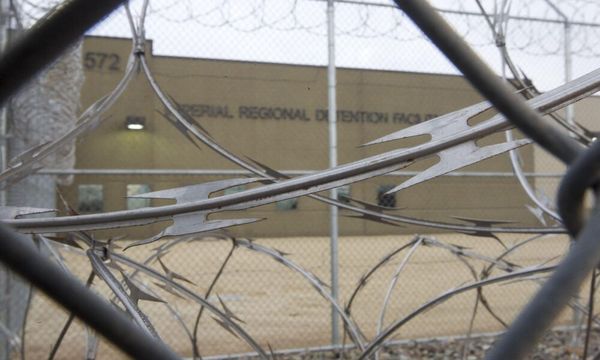
Tunisian President Kaïs Saïed has rejected accusations of racism and pointed to possible legal action for perpetrators of racial attacks, 10 days after announcing a crackdown on illegal migration. Hundreds of sub-Saharan Africans left Tunisia over the weekend while students are encouraged to study online.
On 21 February Saied told security forces to expel all illegal immigrants, accusing African migrants in particular of being part of a conspiracy to change Tunisia’s demographic make-up by making it more African and less Arab.
The African Union condemned his comments as “racialised hate speech”.
Rights groups say the president’s remarks have led to dozens of sub-Saharan Africans being detained, abused and evicted from their homes.
A number of Tunisian intellectuals and artists have expressed outrage against racism in the country.
"What is happening in Tunisia is shameful, it’s painful to see," said Tunisian filmmaker Youssef Chebbi, winner of the Golden Stallion award at the Fespaco film festival.
"The problem of racism in Tunisia existed way before the president’s racist statement," he told RFI, but Saied is using a "populist discourse to distract from his deep lack of competence".
Relaxation of visa rules
President Saied is facing increasing opposition since seizing control of most powers in 2021,shutting down the elected parliament and ruling by decree.
Protestors in Tunis on Sunday defied a protest ban to call for the release of several detained opposition figures seen as critical of Saied.
In a statement published Sunday evening, Saied sought to deflect criticism saying the sources of the alleged racism campaign "are known", without elaborating.
He said Tunisia was proud to be an African country.
“Africans are our brothers,” he said, noting that Tunisia helped found the Organisation of African Unity which became the African Union.
He announced a relaxation of visa rules for African citizens, allowing stays of up to six months instead of three without seeking residency. Students will be able to stay for a year.
Migrants who had overstayed would be able to leave without having to pay fines.
Students forced to study online
Students associations estimate there are between 5,000 and 7,000 sub-Saharan students in Tunisia.
Since the outbreak of racist attacks, many universities are offering online courses and advising students to stay at home.
Dulcinée, 21, a business studies student from Central African Republic, told RFI she hadn't left her lodgings in Tunis for over a week.
She was accustomed to studying online during the Covid-19 pandemic, but back then everyone was doing it.
"The difference is that Tunisians can continue to go to school and we sub-Saharans are doing courses online," she told RFI’s Lilia Blaise.
"Online classes are not very good for us [...] but we have to get used to it because it’s too complicated otherwise; we can’t go outside for fear of being attacked."
Fellow student Gaspard, 22, from Congo said: "We stay in the area, we don’t move around unless it’s really necessary."
Ivorians repatriated
On Saturday, 280 people from sub-Saharan Africa left Tunisia on repatriation flights.
One hundred and forty-five were from Cote d'Ivoire. They were welcomed by a large ministerial delegation, but no families came to greet them, reported RFI’s Bineta Diagne.
After administrative formalities to establish identity and civil status, they were sent to a special centre outside the capital for medical and psychological aid.
Ivorian returnees each receive 160,000 CFA (around €244) to help them re-settle, as well as help finding employment.
Four other such flights are scheduled this week.

Ange Séri Soka, president of a Ivorian support group in Tunisia, welcomed the Ivorian government measures but highlighted difficulties.
"There are nearly 5,000 Ivorians in Tunisia and some of our citizens are sleeping in olive groves and have no shelter because they have been driven out of their homes," he told RFI, calling on Cote d'Ivoire authorities to help people reach the embassy easily and get enrolled.
Dr. Karamoko Gaoussou from the Foreign Affairs Ministry said they were setting up a system to pick people up from the centre of the country and take them to the capital.
"We know it’s difficult for some of them to reach the capital because of harassment," he said.






